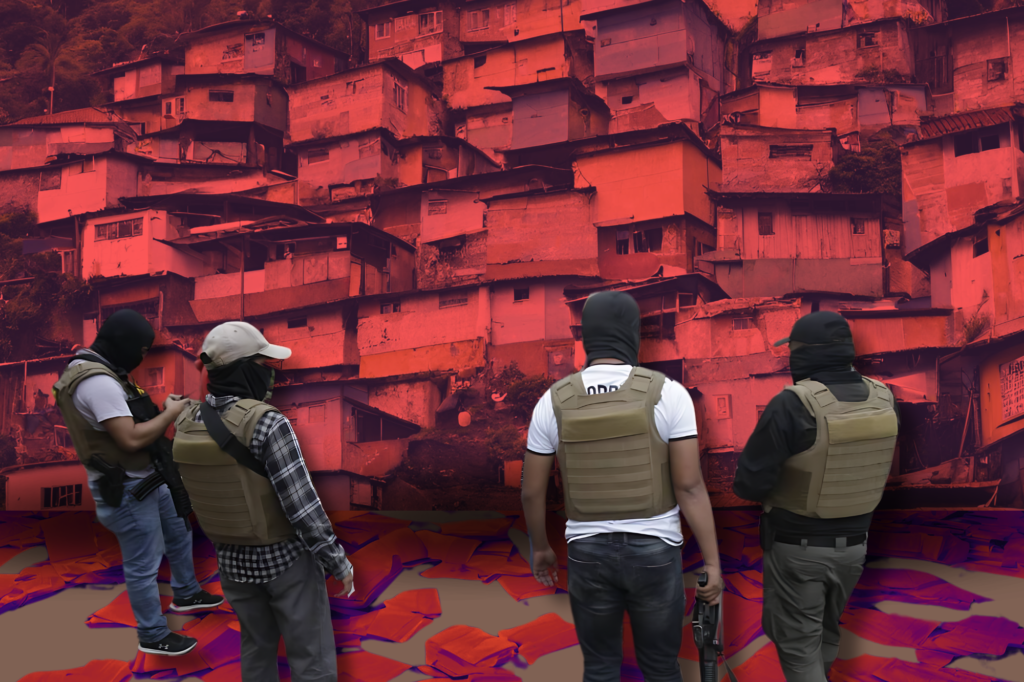Hundreds of Hondurans have filed complaints of abuse, robbery, kidnappings, torture and disappearances against alleged police officers since the state of emergency was declared in December 2022. Authorities claim that criminal groups impersonating police officers are responsible, while victims say the State is to blame. Both the National Human Rights Commission (CONADEH) and the Office of the United Nations High Commissioner for Human Rights (OHCHR) have documented hundreds of complaints against State security forces.
Text: Célia Pousset
Photography: Fernando Destephen
When Heidy manages to get some sleep at night, she has a recurring dream in which her disappeared son returns home. He says, “Mom, give me some food. I’m hungry.” But when she does, he disappears again. She’s alone holding a plate full of food. Then she wakes up and remembers, quite well in fact; the time, the dates, the license plates on the police patrol, the yelling and the insults, the plantain chips and fried chicken she bought before it all happened. She gives a detailed account of the events over and over again as if a movie were constantly playing in her head. It’s a way of holding on to what she has lost and staying strong.
At first she counted the days, then the weeks and now the months. We met with Heidy in a city in Honduras exactly one year after the disappearance of her son, whose whereabouts remain unknown. A group of men wearing the uniform of the Police Directorate against Gangs and Organized Crime (Dirección Policial Anti Maras y Pandillas Contra el Crimen Organizado – Dipampco) kidnapped him.
That evening, Heidy was in the bathroom getting ready for church when she heard a loud knock at the door. Her 18-year-old son asked, “What’s going on, officer?” and a man on the other side said, “Open the door, you son of a bitch.” Then they heard loud noises. The older son left his room and tried to protect his brother. They heard insults again, and a man said, “Authorities are above the law.” Heidy was petrified and didn’t leave the bathroom because she had not taken any clothes with her. She heard a struggle and the voice of the officer: “Let’s go, this son of a bitch knows who we are.” A car drove away. “Mom! They took Julio,” her 18-year-old son yelled. She got out of the bathroom; one of her sons was missing, the other one had his hands severely damaged, and her seven-year-old son was hiding and nervously pulling the collar of his shirt.
Neighbors say that four men wearing brown vests with Dipampco’s yellow insignia got out of a gray pickup truck with no license plates. A police patrol had driven by the house two minutes before and stopped on the street corner. Heidy’s son said he recognized one of the officers when his ski mask fell to the ground. She looked for her son at a nearby police station and at Dipampco’s offices. She also filed a complaint to the Directorate of Police Investigation (Dirección Policía de Investigación – DPI). However, authorities did not comment on the raid. And officers at a nearby police station made fun of her behind her back, “She should look for him on the sugar plantations,” one of them told the other.
Heidy expanded the search and visited hospitals and morgues but to no avail. At the same time, police began harassing her family. Patrols drove by her house looking for the son who witnessed the events. One day, Heidy’s husband angrily yelled at them, “Isn’t it enough that you kidnapped my son?” A police officer responded, “You’ll see. Be careful.” Three months after Julio’s disappearance, hitmen murdered Heidy’s husband at her house. Then the police arrested the son whose hands had sustained severe damage. He was accused of being part of a criminal group and sent to prison while awaiting trial.
Since December 2022, Honduras has been under a state of emergency, which has been extended every 45 days. The Secretariat of Security boasts about positive results such as a reduction in homicides by 17 percent. However, constitutional rights – including the inviolability of the home – are suspended, and the government is trying to hide a series of arbitrary actions and crimes under these alleged results.
The day that the state of emergency began, Gustavo Sánchez, then head of National Police, said the goal is to weaken criminal groups but with respect for human rights, “affecting only one percent of the population.” Sánchez – now secretary of security – maintains that the suspension of rights only affects “criminals.” CONADEH told Contracorriente that 2,147 complaints of abuse of authority, incrimination with false evidence, death threats, inhumane and cruel treatment, forced disappearances, theft and murder have been filed against State security forces since December 2022.
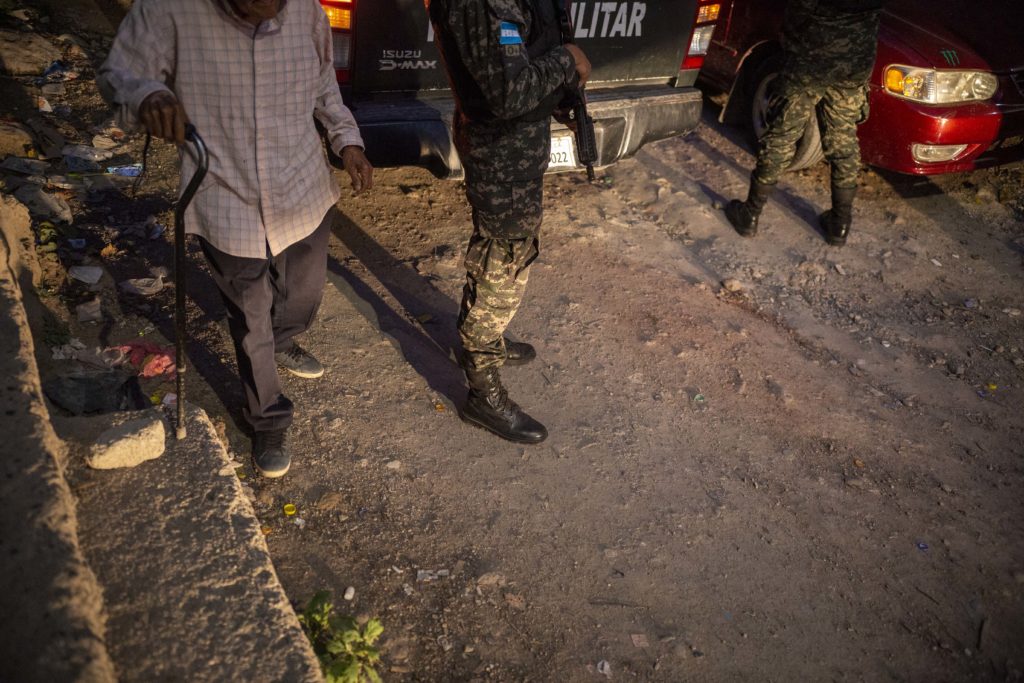
A failed reform of the National Police and authorities’ ambiguous discourse recognizing the presence of criminals within institutions adds to Honduras’ security problems. In mid-March, Sánchez stated in a press conference: “Drug traffickers utilized institutions during the administration of former President Juan Orlando Hernández, and it’s a serious issue not to mention it.” He also explained that 2,531 officers were removed from the National Police between 2022 and 2023. However, he didn’t comment on the crimes for which these officers were purged or if these are related to complaints of violent acts filed by citizens. On the contrary, he said it’s not fair that the police are blamed for all the corruption and problems in the country.
“They come almost every day to our house to hurt us”
Sofía, 25, and Carmen, 23, live in Honduras’ Central District. Six months ago, alleged Dipampco agents began regularly arriving at their house to hit them and to force Sofía to sell drugs. The agents threatened to “sell” her to the Barrio 18 gang or send her to prison to die “like the women from PNFAS.” They were alluding to the massacre that took place in the National Women’s Penitentiary for Social Adaptation (Penitenciaría Nacional Femenina de Adaptación Social – PNFAS) on June 21, 2023, when 46 inmates died. The police identified most of the victims as members of the MS-13 gang.
Only women and minors live in the house. Visits by Dipampco agents used to occur once every two weeks but now every other day. Visits can take place in the morning, in the afternoon or in the evening and can last several hours.
“More than eight men come. They cover their faces and wear brown vests with yellow letters. They show their badges when they come in. They tell us to take off our clothes – except our underwear – and order us to do squats. It’s embarrassing. They also tell us to take off the baby’s diaper to make sure we’re not hiding drugs there. They put black bags over our heads and tighten them to torture us. If we scream, they take us to jail and the children to the Directorate of Childhood, Adolescents and Family (Dirección de Niñez, Adolescencia y Familia – Dinaf). They tell the children that they are going to be raped there, so they cry when they hear that,” Sofía said with a tired voice.
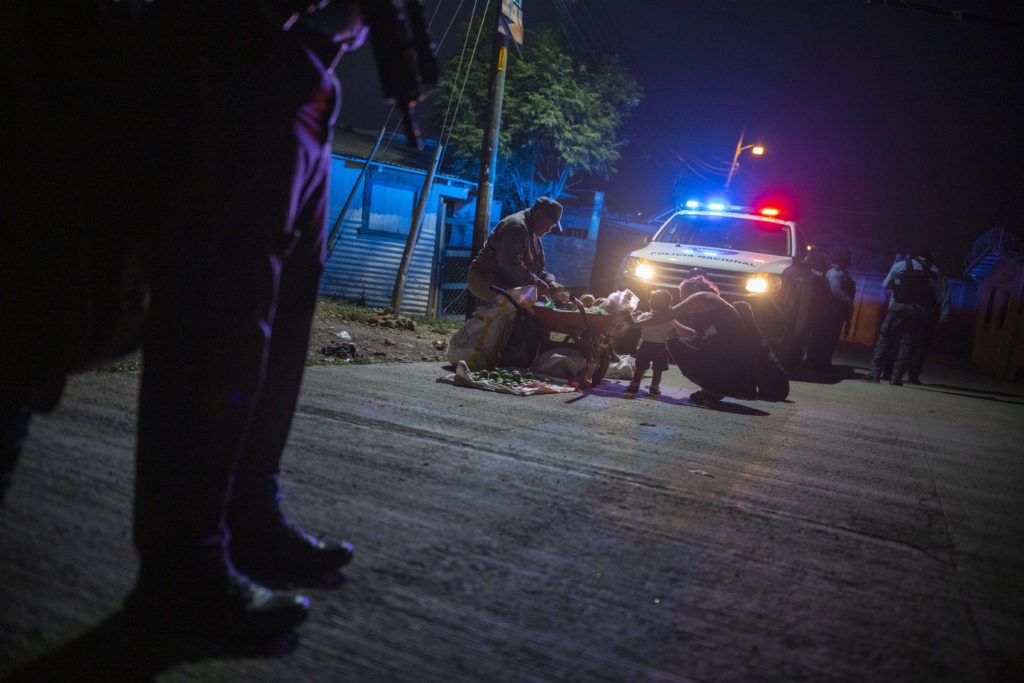
Sofía has dark circles under her eyes because she hasn’t slept well for months. The persecution she has experienced has led her to poverty; she has had to sleep on the streets to not put her family at risk as the police are specifically looking for her. The women who live at that house were identified as members of the MS-13 gang because their relatives died in the massacre of June 21. “They tell us, ‘Bitches, you are going to prison, where your sisters were burned alive,’ ” she recalled.
“Stop hitting them or we’ll call HCH [a Honduran news outlet],” neighbors said once, trying to intervene, but the police wrote down their names to scare them. Sofía and Carmen don’t know why those officers are so cruel or where they could go to escape from them. But they believe their connection to the victims of the prison massacre makes them a target, or the police are trying to meet arrest quotas in their neighborhood required by the state of emergency.
According to information provided by CONADEH, since the state of emergency began, State security forces have been allegedly involved in 10 forced disappearances, 21 murders, 18 homicides, two femicides and 14 forced displacements. Furthermore, CONADEH’s report on gender violence during the state of emergency explains that most accusations of human rights violations against girls, adolescents and women point to Dipampco. The report describes the case of a woman who was kidnapped by agents of that institution for 24 hours. They forced her into the patrol and demanded money from the victim, per her testimony. The report also reveals that petitioners usually ask for help finding relatives who have been arrested during the raids but whose whereabouts are unknown.
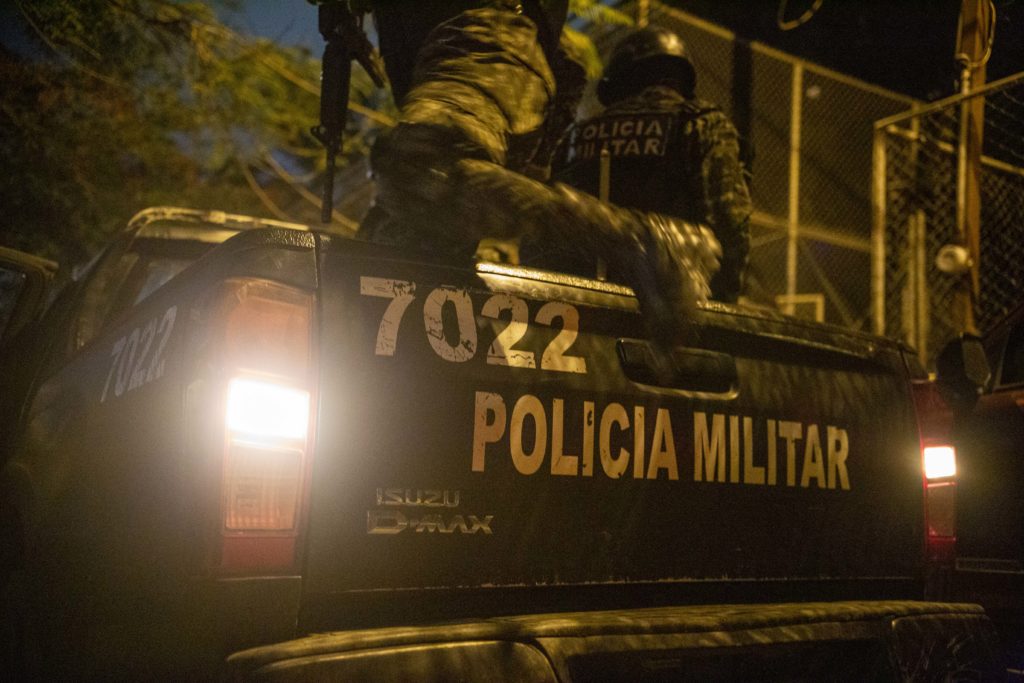
According to Iliana Licona, investigator at CONADEH, the state of emergency exposes girls and women to State violence because the inviolability of the home is suspended. “Police are allowed to conduct warrantless home searches. In many cases, women are alone or with minors, as they usually take care of household chores. Most women who have filed complaints live alone and are vulnerable because their partners have been arrested. One of the victims who filed a complaint says that after her partner was arrested, police officers returned to her house and sexually abused her in the presence of minors,” Licona said.
A social worker at a juvenile court agreed to talk to us on the condition of anonymity. She has seen people – mostly young men arrested during the state of emergency – with clear signs of torture. “I have seen young men whose nails have been removed or with cigarette burns on their skin. There is a pattern of torture since many claim to have been suffocated with plastic bags and sometimes with lime while being hit in the stomach,” she said.
“Police officers are committing torture; they bring young men to the court with a report from the Prosecutor’s Office, who I think are accomplices because they never ask about the minors’ health. No one is stopping the abuses and the violence, as if they were completely normal,” she added.
Reports of abuses during the state of emergency are still coming out. The United Nations Human Rights Office of the High Commissioner (OHCHR) published the report Situation of Human Rights in Honduras on March 19, 2024. It states that at least seven forced disappearances, five extrajudicial killings, four cases of torture and one of sexual violence were reported to the office in 2023. Complaints of illegal detentions, abuses during warrantless home searches and planting of evidence, especially in the departments of Cortés, Yoro and Francisco Morazán, were also documented.
The social worker confirmed the data from the report. She noticed “inconsistencies” in statements from the police, particularly the circumstances that led to the arrests that she processed. “They already know what to say and always give the same account: ‘We were patrolling the area when we suddenly noticed a male suspect who was dressed in a certain way and tried to run as soon as he saw the police.’ But it’s a lie,” she said. In fact, after interviewing the alleged offenders, she realizes that they are usually arrested at home past midnight, after police officers break in.
Heidy found out that the report on the arrest of her son was not accurate. It was submitted to the Prosecutor’s Office, stating that he was arrested at 9 a.m., but the arrest actually took place at 3 a.m.
She hasn’t trusted the police for a long time, but when her husband was murdered, she became more suspicious. She’s convinced that the National Police are involved.
On the evening of the murder, she and her sons went out to buy candy at a nearby store, and her husband stayed in the house alone. Half a block away from her house, she heard gunshots, and the neighbors yelled: “They killed Heidy’s son!” But he said, “No, I’m right here!” Then she ran back to the house and found her husband dead. The police arrived two minutes later like “angels coming to our rescue,” Heidy said with irony in her voice.
The police said they were patrolling the area when they heard the gunshots. They made the report and stayed at Heidy’s house while she and her sons took him to the hospital. When she returned, she noticed some of her belongings had been stolen.
One vest and too many crimes
At Dipampco’s main offices in Tegucigalpa, Mario Fu, spokesperson for the institution, stood up and showed the bulletproof vest, “Look, our vest is different; it’s similar but not exactly the same.” He had just shown a video from June 2023 in which men wearing the institution’s vest got out of a pickup truck to rob a business in the February 21st neighborhood in Tegucigalpa. “You can see that they did not receive proper police training,” he said, referring to their awkward movements.
Fu firmly denies any involvement of Dipampco agents in acts of violence against the population: “We have been issuing warnings for weeks about a group who’s wearing similar uniforms. Criminal groups are trying to discredit our institution,” said Fu, who has been spokesperson for Dipampco since it was called the National Anti-Gang Force (Fuerza Nacional Anti Maras y Pandillas – FNAMP) and led by the military. Fu says they received six complaints of forced entries against alleged members of the institution in Tegucigalpa in a one-year period: one case in La Laguna, two in the village of La Cuesta and three in sector Emmanuel and Río Abajo. “These cases are being investigated, but Dipampco was not involved in any of them,” he added.
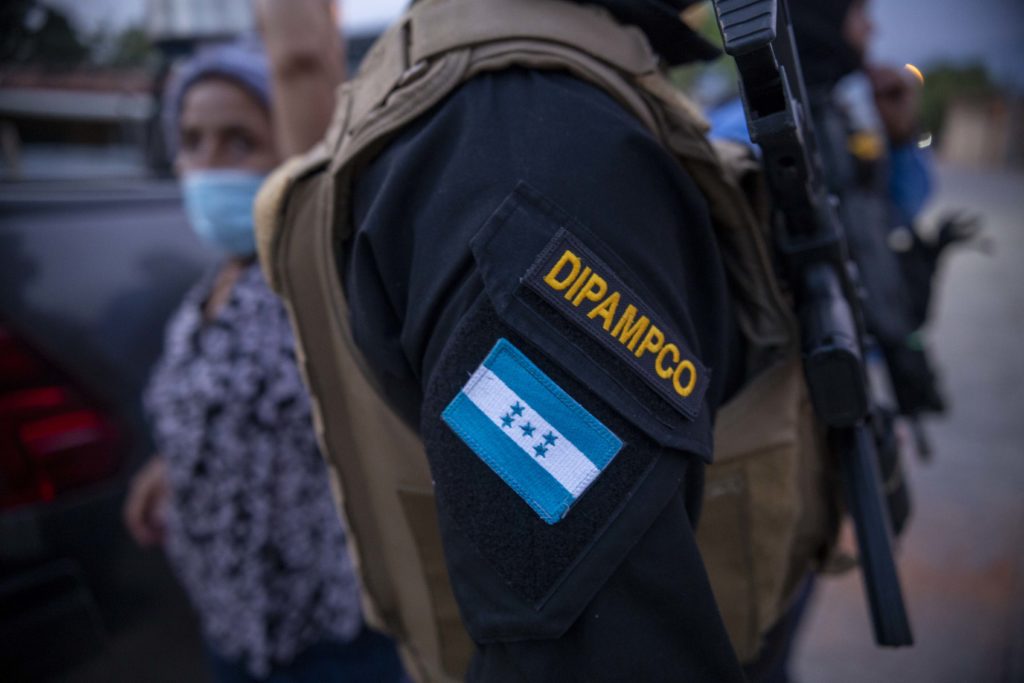
In one case, victims said that the alleged Dipampco agents arrived at their house and acted “aggressively” while looking for family members without “presenting an arrest warrant.” Fu insists that there are criminal groups in the areas where these events take place. He says it’s very easy to obtain military or police equipment in stores, and criminal groups could rent pickup trucks similar to those of the police. He asserted that they’re investigating “individuals who obtain police apparel, on which they add a homemade embroidery to make it look authentic.”
Police Honduras, a store located in Tegucigalpa and owned by a DPI agent, sells police apparel and equipment. A sales representative said that products are available to civilians, but if they want to purchase police hats, insignias and name tags, they should identify themselves as members of the police. Any citizen, however, can buy pants, boots, brass knuckles, the Punisher logo (used by the “Tigres,” a special military police unit) and bulletproof vests – which are thinner, have a low neckline and are different from those of the police.
Authorities’ silence and the usual explanation that “criminal groups are posing as State security forces” are not defensible when new cases are analyzed. For example, the murder of Wilson Pérez and the kidnapping of a trans woman (by alleged members of Dipampco), both of which took place in San Pedro Sula, or the massacre at a billiard hall in Choloma, a crime attributed to the Barrio 18 gang in which arrested perpetrators had Dipampco apparel in their possession.
When asked about the police abuse, Sánchez said that the National Anti-Gang Force (Fuerza Nacional Anti Maras y Pandillas – FNAMP), which is led by the military, is responsible for actions carried out by purged police officers and not Dipampco, which is led by the police. He mentioned the murder of Wilson Pérez in San Pedro Sula, although when it took place, the institution was led by the National Police and not the Armed Forces.
Serving and protecting criminals
On March 12, 2023, around 150 former police officers gathered outside the Presidential Palace with banners, demanding a meeting with Honduras President Xiomara Castro. “The commission responsible for purging the police played a key role in dismissing officers who obstructed activities of the Hernández Cartel,” one of the banners read.
The group is just a handful of the more than 6,000 police officers dismissed by the Special Commission for the Purging and Reformation of the National Police (Comisión Especial para la Depuración y Transformación de la Policía Nacional) in 2016.
The police reform was promoted after active members of the National Police committed multiple murders. For example, the son of Julieta Castellanos, then president of the National Autonomous University of Honduras, and Arístides González, “the anti-drug czar of Honduras,” who was murdered at a police station. Although this process is necessary, it was corrupted and questioned for not following established procedures to correctly determine the responsibilities of purged police officers.
Pretrial hearings were not allowed, and only a few cases were submitted to the Attorney General’s Office for further investigation. Sánchez says it was a maneuver by Tigre Bonilla to get rid of the competition. Bonilla is the former head of Honduras’ National Police who pleaded guilty to drug trafficking charges in New York in February 2024.
Members of the Organization of Illegally Dismissed Police Officers (Organización de Policías Despedidos Ilegalmente – OPDI) are taking advantage of Hernández’s conviction in the U.S. and say they are “victims” of law enforcement policy implemented by drug traffickers. They demand that the Supreme Court addresses pending complaints and National Congress discusses a draft bill presented by congressional representative Eduardo Díaz Velásquez that would supposedly restore their rights.
The group of purged police officers are by no means “saints,” as they themselves have acknowledged. And it’s perhaps one of the few groups that allows police corruption and connections to organized crime. We spoke to a former commissioner who was dismissed after working for 22 years. He says the police provide uniforms and guns to criminal groups, who take care of the dirty work for them. He mentioned an interesting case concerning two heavyweights of organized crime: Los Cachiros and Tigre Bonilla.
According to the former commissioner, Hernández wanted to kill the Rivera Maradiaga brothers, leaders of Los Cachiros, in 2013. The National Police gave uniforms and weapons to Los Cachiros’ rival cartel, the Atlantic Cartel, to carry out the killings. But the operation did not go according to plan because he and other police officers seized a pickup truck full of police and military uniforms of different ranks and military-grade weapons in northern Honduras. They apprehended the driver, a member of the Atlantic Cartel known as Misko. “Three days later, Tigre Bonilla called me to his office in Tegucigalpa. He asked me if I thought I was in charge of the National Police and if I wanted to die,” the former commissioner recalls. Bonilla also asked him why he was not informed of the operation and why they referred the case to the Prosecutor’s Office if they were not ordered to do so.
The former commissioner understood that Tigre Bonilla was threatening him. Two police officers who participated in the raid were murdered. Misko was released and asked the U.S. embassy for help to leave the country.
The Honduran State, which has protected criminals, reached the highest level of corruption during Hernández’s two presidential terms. But corruption is still present. Criminal groups’ choke hold on the National Police remains, and authorities resist admitting the depth of such a systemic problem, which goes beyond the arrest of Tigre Bonilla, Mauricio Hernández Pineda and other former police officers serving time in the U.S.
We met with an active member of Dipampco in a coffee shop in Tegucigalpa. He’s dressed as a civilian, is wearing sunglasses and seems a little mistrustful. The conversation shifted between his feeling of pride in his work and resignation about the “corruption” within the institution. He says he cannot trust his colleagues:“Nobody knows who’s working for criminal groups. We all suspect one another. I pretend to be part of a criminal group to find out more about my colleagues…” He doesn’t finish the sentence. He’s looking for something on his phone but cannot find it. He continues, “A few months ago, a photo of us was leaked. We found it on the phone of a gang member we arrested.” The photo was taken at the office and showed the faces of police officers who were cleaning. The investigation to determine who released the photo was inconclusive. When there’s suspicion about an agent, they’re simply reassigned, he adds.
Before joining Dipampco, the police officer was in another division in a different part of the country, where he was head of a unit. He says a leader of the MS-13 gang offered him 40,000 lempiras (around $1,600) per week in exchange for not meddling in the gang’s activities. But he never responded to them. They seized a cocaine laboratory run by that gang a few months later. “Criminal groups always try to bribe high-ranking officials, and that’s why some of them are part of those groups. When high-ranking officials are involved, there’s not much that can be done. We are either part of the institution or without a job. We follow orders and sometimes carry out raids in locations where it doesn’t make sense in order to allow drugs through,” he explained.
The trail of impunity is long. The Dipampco officer said that two police officers and an official “kidnapped and murdered” a young boy in San Pedro Sula a couple of years ago. The perpetrators were sent to prison, but that is not always the case. “Sometimes police officers are arrested and they say they know the prosecutors and the judges, who are going to release them,” he said. According to the officer, it’s necessary to create a unit in the Attorney General’s Office that independently investigates police officers and vice versa.
We asked Sánchez about the current collusion between members of the National Police and organized crime, and he responded, “We’re not denying the corruption, but the problem is across the board and affects multiple institutions in the country. It’s a mistake to assume the National Police is solely to blame.”
Cases piling up at the Attorney General’s Office
A group of more than 30 campesinos gathered outside the Attorney General’s Office on February 12, 2024. Not so much fear but indignation could be heard in their voices. They come from Río Abajo, a village close to Tegucigalpa, to file a complaint to the Attorney General’s Office. A few days before, individuals wearing the Dipampco uniform broke into the farmers’ cooperative and stole money from several members of the community.
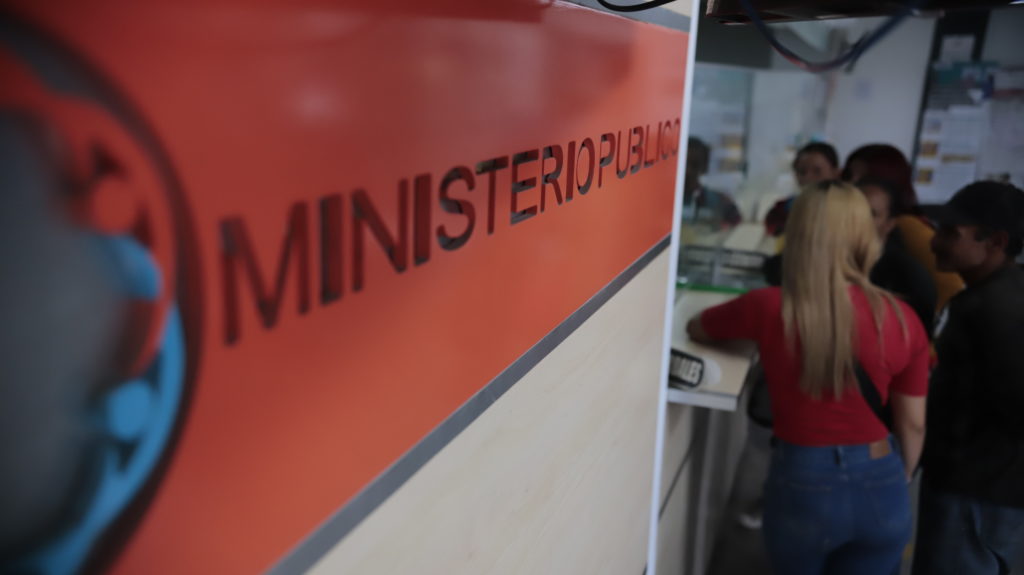
The alleged police officers knocked on the door of María Elena’s house at 5 a.m. She asked them to wait so she could get dressed, but they didn’t listen to her. They forcibly entered the house and told her: “You whore, where do you keep the drugs?” They thought she was a “leader of the MS-13 gang” and told her to sit down for an interrogation. She wasn’t properly dressed and had to cover herself with a towel. They didn’t find anything, so they went to her sister’s house and stole the money she had saved for her children’s school supplies. Then, they broke into another house of the farmers’ cooperative and stole more than 7,000 lempiras (around $280).
“Madame President, who are the individuals robbing the population with weapons and uniforms from the State? Do you pay them? Do you pay them to rob the money we earn from work and save in order to survive? Madame President, I’m 53 years old, and this is too much for me. Authorities say they’re looking for gang members and extorters, but you’re looking in the wrong place because the real criminals are those who were appointed to protect the population. Please get rid of those corrupt police officers who steal and torture. Our children are terrorized and cannot see a police officer without shaking in fear. I ask wholeheartedly that you purge corrupt police officers!” demanded María Helena when we spoke at her house, which is located between plantain and corn fields. Other people whisper but she yells. And she’s not the only one.
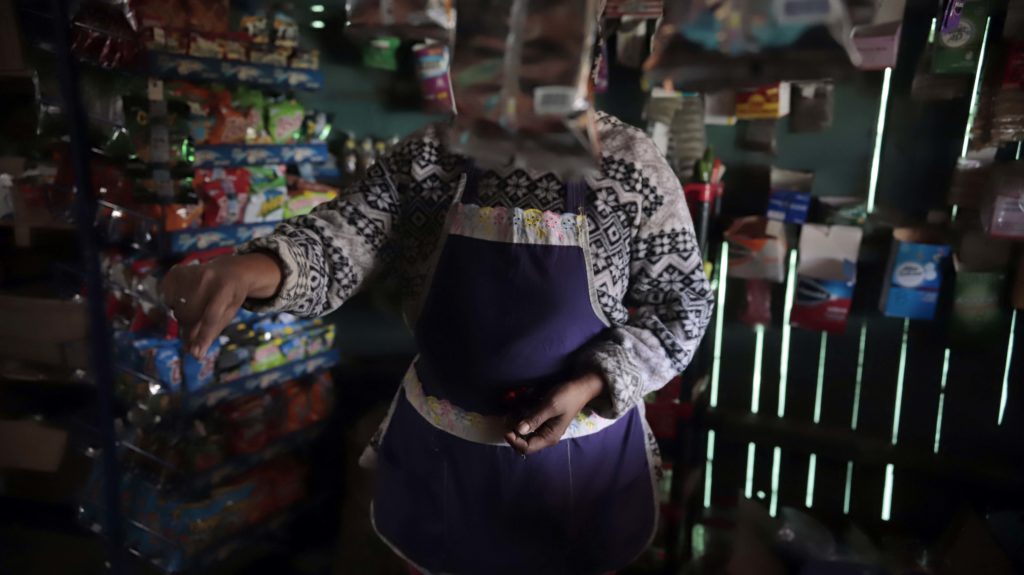
Complaints against State security forces are piling up at the Attorney General’s Office. Between 2023 and 2024, the Office received 295 complaints (243 in 2023 and 52 in 2024) claiming that State security forces are responsible for “abuse of authority, threats, theft, cruel and degrading treatment, falsely reporting crimes, attempted homicide and attempted rape.”
Of the 295 complaints, most were filed against police officers of different ranks and divisions, and 63 were filed against military officers. Two officials at the Human Rights Directorate of the Secretariat of Defense (Dirección de Derechos Humanos de la Secretaría de Defensa) told Contracorriente that they are unaware of those complaints and of the 125 complaints filed to CONADEH by civilians against members of the Armed Forces since December 2022.
Such complaints rarely lead to changes within the National Police and the Armed Forces, or to a judicial process. Only 28 members of State security forces were indicted in 2023 and none in 2024.
Last year, María Helena filed another complaint of abuse against alleged police officers, but authorities didn’t follow up on the case. In the official complaint of January 2023, the account is similar to what she would experience again one year later: “The victim says that members of the National Police and Dipampco forcibly entered her house, breaking the front door, yesterday at around 5:40 a.m. They went into the rooms and looked through the clothes. The victim asked if they had a court order, but they said they didn’t need one and they could come and go as they please.” She filed another complaint on February 12, 2024. Both events took place during the state of emergency.
Mario Fu knows about the case of the farmers’ cooperative and firmly maintains that the attackers are not members of the institution but individuals posing as such. He explained that the area is of strategic interest to “criminal groups” because it leads to the only highway that connects to the department of Olancho, where weapons traffickers have a significant presence.
As authorities haven’t addressed María Helena’s complaints, her impression remains the same: police officers are criminals, and criminals are police officers. At the very least, they both act the same.
Heidy and her seven-year-old son recently moved to a new house. She wakes up every day without understanding why God allowed her family to be taken away. Sometimes she doesn’t want to get out of bed, but she has to take care of her younger son, who now pulls the collar of his shirts to calm his anxiety. Heidy bought him a dozen t-shirts, and he ruined all of them. They are both experiencing the grief of forced disappearances, murder, persecution and criminalization while hiding from the police to avoid becoming witnesses under threat. This is yet another Honduran family torn apart by violence.
The names of the victims were not disclosed to protect their identities.
This investigation was carried out in collaboration with the Consortium to Support Independent Journalism in Latin America (CAPIR), which is led by the Institute for War and Peace Reporting (IWPR).
Translation by José Rivera

